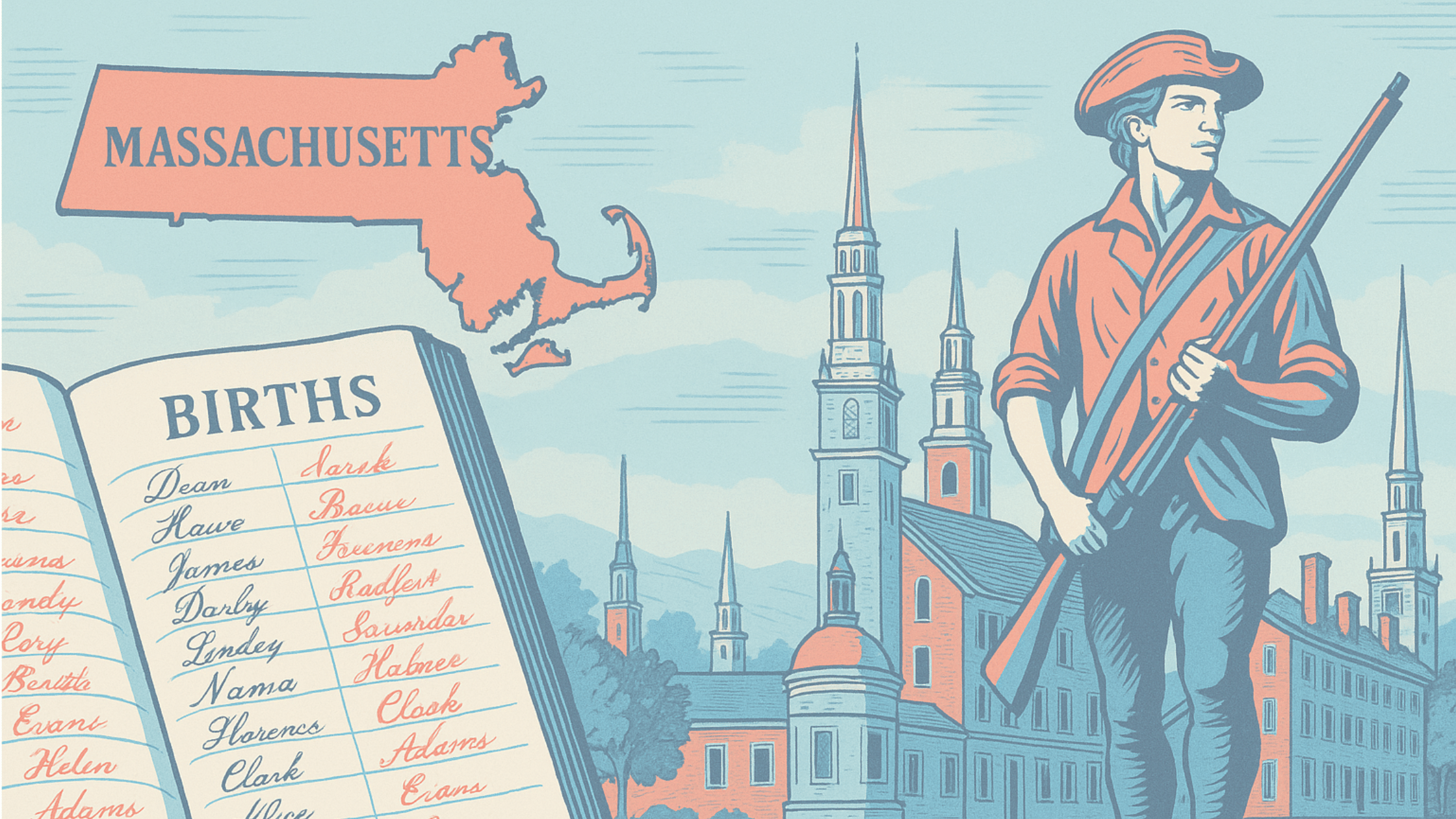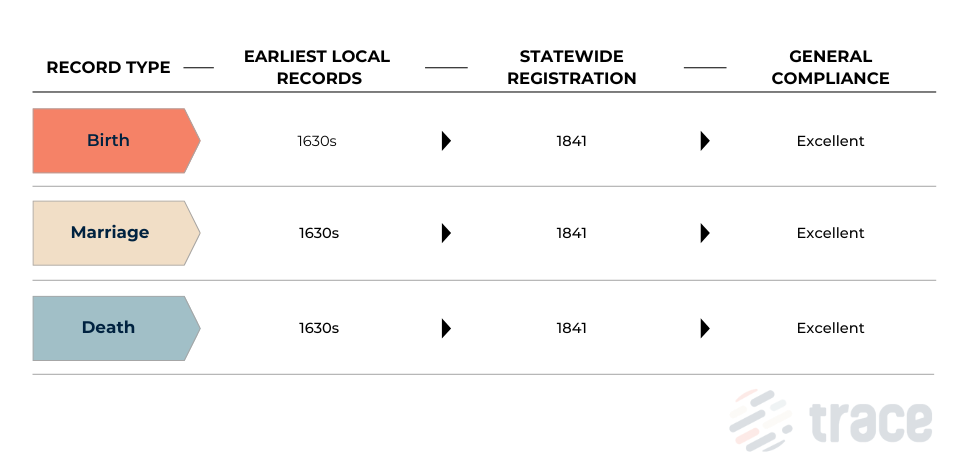Massachusetts stands at the heart of American family history. From early colonial settlers to twentieth-century immigrants, generations of families have left a deep paper trail across its towns and cities. Tracing your Massachusetts ancestry opens a window into nearly four hundred years of records, including births, marriages, land deeds, and military service, each capturing a chapter of life in one of America’s most historically rich states.
Working with Trace genealogists gives you access to the insight, historical context, and local familiarity needed to bring these records to life. Whether your ancestors arrived on the Mayflower, fought at Bunker Hill, or worked in the mills of Lowell, their stories still live in Massachusetts archives waiting to be rediscovered.

The story of Massachusetts begins in 1620, when English Pilgrims founded Plymouth Colony on the shores of Cape Cod Bay. A decade later, the arrival of Puritans to the Massachusetts Bay Colony established Boston as a thriving religious and commercial center. These early English communities created detailed civic and church records that remain among the most complete in early America.
During the seventeenth and eighteenth centuries, Massachusetts grew as a hub of trade, education, and political thought. Settlers moved inland from the coast, founding towns across Essex, Middlesex, and Worcester counties. Coastal shipyards and inland farms fueled a diverse colonial economy, while Boston emerged as the intellectual and revolutionary heart of New England. The colony’s citizens were instrumental in the events leading to independence, leaving abundant military and civic documentation that illuminates families’ roles in the American Revolution.
Following independence, Massachusetts continued to evolve through industry and migration. The early nineteenth century brought the rise of textile manufacturing in Lowell, Lawrence, and Fall River, drawing rural New Englanders and immigrant workers into new industrial towns. Irish, Italian, French-Canadian, and later Eastern European families arrived in growing numbers, enriching the state’s cultural fabric and leaving behind parish, naturalization, and employment records.
The late nineteenth and early twentieth centuries saw significant migration both into and out of Massachusetts. Many descendants of early New England families moved westward, while new immigrants from Poland, Lithuania, Portugal, and beyond found opportunity in the state’s expanding cities. Boston became a port of entry and cultural crossroads, preserving records that reflect the blending of long-established Yankee families with global newcomers.
Through the twentieth century, Massachusetts balanced tradition and transformation. The decline of manufacturing, growth of higher education, and postwar suburbanization changed where and how families lived, but local recordkeeping remained strong. The continuity of town and state record systems ensures that nearly every generation has left a trace, making Massachusetts one of the most rewarding states for genealogical discovery.
Massachusetts towns began recording vital events as early as the 1630s, and their thoroughness is unmatched. Trace researchers interpret these long-running records to establish generational continuity, even when names or jurisdictions changed over time.
Religious life in Massachusetts produced a variety of records, from Puritan meetinghouse logs to Catholic and Episcopal registers. These documents often reveal community relationships and migration patterns within the state’s diverse population.
Deeds, wills, and estate inventories provide insight into family structure and economic life. Trace genealogists use these materials to connect individuals across generations and reconstruct local networks of kinship and property.
Massachusetts families appear prominently in service documentation from the seventeenth century onward. Colonial militia rolls, Revolutionary War rosters, Civil War enlistments, and twentieth-century draft registrations all record the names and experiences of residents who served their communities and country. These materials often help genealogists identify new generations and link families to major historical events.
As one of the earliest and busiest ports in the United States, Massachusetts holds a long record of arrivals and citizenship petitions. Immigration registers, ship passenger lists, and naturalization files trace families who came seeking opportunity and built lasting communities. Studying these records provides valuable context about origins, occupations, and the evolving character of Massachusetts’s towns and cities.

These long-standing records form a remarkably consistent foundation for genealogical study. Trace genealogists interpret them within their historical context to construct accurate, enduring family narratives.
Massachusetts preserves one of the deepest collections of historical records in the United States. Generations of families appear in sources that capture both daily life and defining moments.
Trace genealogists draw from these varied materials to create a coherent narrative that connects ancestors to the people, places, and events that shaped their world.
Massachusetts research rewards attention to historical context. The state’s long recordkeeping tradition offers remarkable opportunities, and Trace genealogists combine familiarity with Massachusetts history and careful analytical methods to reveal the stories within complex archival materials. Their expertise brings clarity and continuity to your family’s lineage.
Trace researchers specialize in discovering and documenting family histories across Massachusetts’s centuries of change. Whether confirming colonial ancestry, tracing Revolutionary War participants, or identifying immigrant origins, our team combines historical expertise with personalized research. Every project is built on evidence, context, and care, transforming historical records into a living story of your family’s journey through the Bay State.
Massachusetts offers a rare continuity of records that allows families to trace their stories across time. Working with Trace connects you to professionals who understand both the sources and the stories they tell.
Start your Massachusetts genealogy research with Trace today.